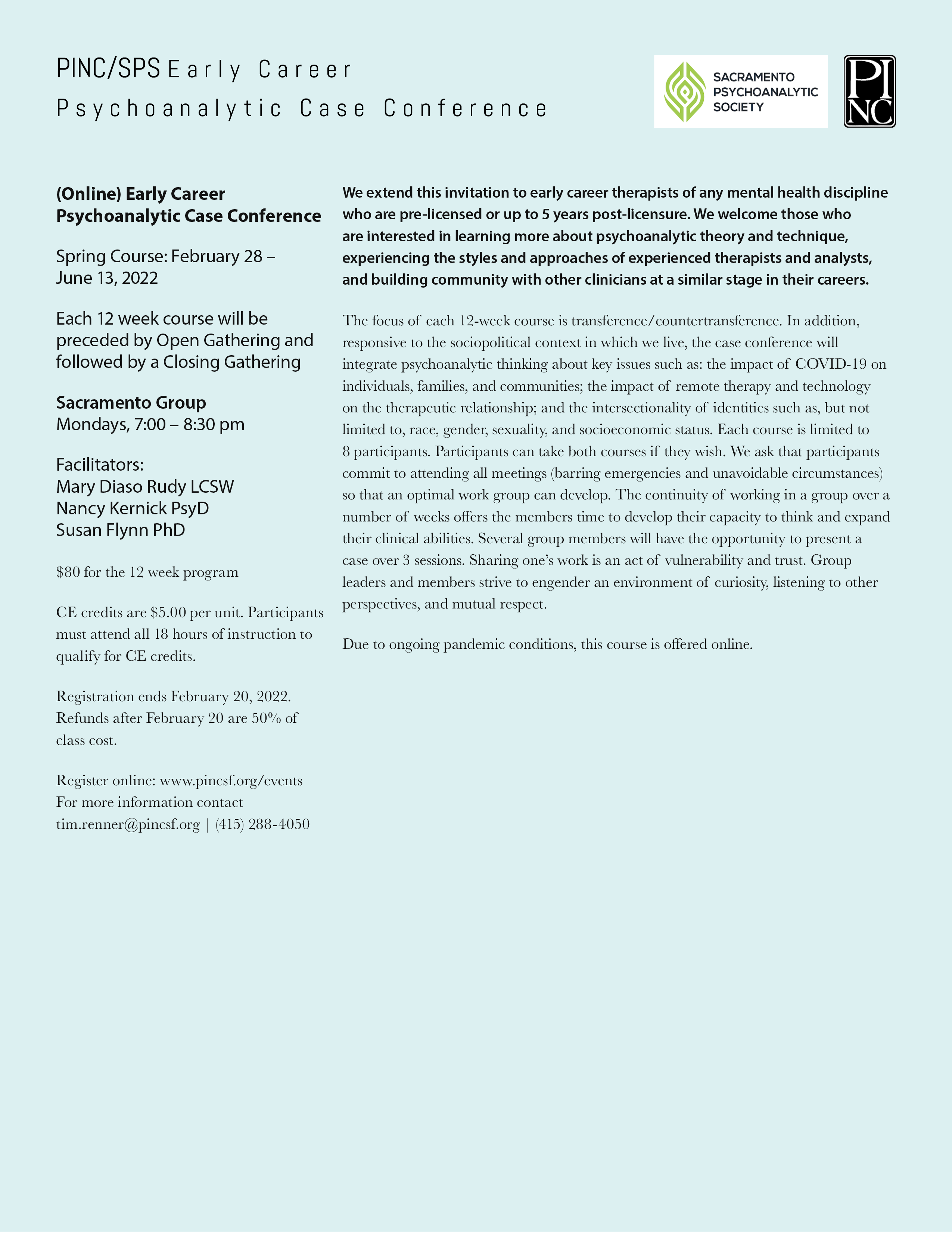SPS PINC Early Career Psychoanalytic Case Conference
(Online) Early Career Psychoanalytic Case Conference
Mary Diaso Rudy LCSW; Nancy Kernick PsyD; Susan Flynn PhD
14 Sessions, Monday Feb 28 – Jun 13, 7:00 PM – 8:30 PM
We extend this invitation to early career therapists of any mental health discipline who are pre-licensed or up to 5 years post-licensure. We welcome those who are interested in learning more about psychoanalytic theory and technique, experiencing the styles and approaches of experienced therapists and analysts, and building community with other clinicians at a similar stage in their careers.
 The focus of each 12-week course is transference/countertransference. In addition, responsive to the sociopolitical context in which we live, the case conference will integrate psychoanalytic thinking about key issues such as: the impact of COVID-19 on individuals, families, and communities; the impact of remote therapy and technology on the therapeutic relationship; and the intersectionality of identities such as, but not limited to, race, gender, sexuality, and socioeconomic status. Each course is limited to 8 participants. Participants can take both courses if they wish. We ask that participants commit to attending all meetings (barring emergencies and unavoidable circumstances) so that an optimal work group can develop. The continuity of working in a group over a number of weeks offers the members time to develop their capacity to think and expand their clinical abilities. Several group members will have the opportunity to present a case over 3 sessions. Sharing one’s work is an act of vulnerability and trust. Group leaders and members strive to engender an environment of curiosity, listening to other perspectives, and mutual respect. Due to ongoing pandemic conditions, this course is offered online.
The focus of each 12-week course is transference/countertransference. In addition, responsive to the sociopolitical context in which we live, the case conference will integrate psychoanalytic thinking about key issues such as: the impact of COVID-19 on individuals, families, and communities; the impact of remote therapy and technology on the therapeutic relationship; and the intersectionality of identities such as, but not limited to, race, gender, sexuality, and socioeconomic status. Each course is limited to 8 participants. Participants can take both courses if they wish. We ask that participants commit to attending all meetings (barring emergencies and unavoidable circumstances) so that an optimal work group can develop. The continuity of working in a group over a number of weeks offers the members time to develop their capacity to think and expand their clinical abilities. Several group members will have the opportunity to present a case over 3 sessions. Sharing one’s work is an act of vulnerability and trust. Group leaders and members strive to engender an environment of curiosity, listening to other perspectives, and mutual respect. Due to ongoing pandemic conditions, this course is offered online.
CE Credits offered: 18
Course Objectives
After completing this course participants will be able to:
- Delineate different ways to take and present process notes.
- Discuss the psychoanalytic concepts of transference and countertransference as presentedby each facilitator.
- Articulate the impact the patient’s history has on the participants and hypothesize how that impact is one factor contributing to the participants’ assessment of the patient.
- Assess how race impacts the countertransference experience of the therapist and group.
- Assess how cultural aspects impact the countertransference responses of the therapist and group.
- Assess how the participants’ own therapy experiences affect their understanding of the therapeutic process they are observing.
- Assess the developmental aspects of anxieties as they emerge in the ongoing treatment.
- Consider the meaning of the presence or absence of dream material during the sessions between therapist and patient.
- Articulate the theory of how unconscious group dynamics in a case conference can express aspects of the case being presented.
- Assess the communication in the therapeutic encounter coming through the somatic responses of the therapist and patient.
- Consider and describe various countertransference responses evoked by different diagnostic categories.
- Demonstrate an ability to hear multiple levels of meaning in a patient’s communication.
- Demonstrate an ability to hear multiple levels of meaning in the therapist’s communication.
- Explore the feelings, fantasies, and anxieties in the patient’s narrative that prompt the emergence of clinical themes stemming from the group discussion.
- Analyze how the leading anxieties and defenses presented by the patient affect the transference in the therapy dyad.
- Analyze how the leading anxieties and defenses presented by the patient affect the countertransference in the therapy dyad.
- Delineate the difference between appropriate clinical empathy and an over-empathic clinical stance based on over-identification with the patient.
- Assess the importance of the therapist’s dreams, associations, and reverie’s related to this patient during and in between sessions.
pincsf.org/events – 415-288-4050 — 530 Bush St, Suite 700, SF CA USA — pincsf@gmail.com
The Psychoanalytic Institute of Northern California (PINC) is approved by the American Psychological Association to sponsor continuing education for psychologists. PINC maintains responsibility for this program and its content. Visit pincsf.org/policies for policies and disclaimers.
Sacramento, CA
United States
| Case conference | $ 120.00 |
| CE Credits (18) | $ 90.00 |
